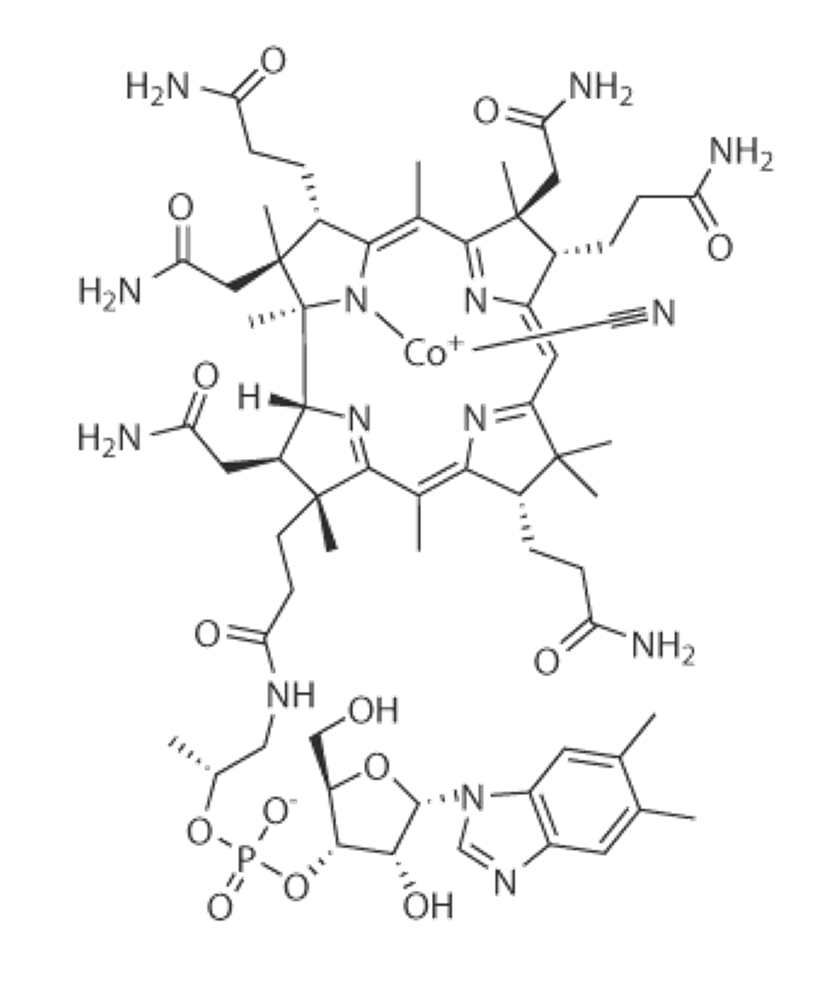B12
Longevity Benefits
- Supports folate metabolism.
- Supports DNA methylation.
- Regulates normal DNA function.
- Reduces homocysteine levels.

Quantity of ingredient in each package
Method of consumption, and precautions
Production process and inspection.
Unlocking Longevity: The Vital Role of Vitamin B12
Vitamin B12, a crucial water-soluble vitamin, plays a multifaceted role in human health. Beyond its well-known function in red blood cell production, B12 is increasingly recognized as a key player in promoting longevity and overall well-being.
Why is B12 so important for longevity?
- Energy Production: B12 is essential for the proper functioning of mitochondria, the powerhouses of our cells. It plays a critical role in the production of energy, which is vital for all cellular processes, including repair, growth, and detoxification.
- Cognitive Function: B12 deficiency has been linked to cognitive decline, including memory problems, dementia, and Alzheimer's disease. Adequate B12 levels are crucial for maintaining brain health and cognitive function throughout the lifespan.
- Mental Health: B12 plays a role in the production of neurotransmitters, chemicals that transmit signals between nerve cells. Deficiencies can -contribute to mood disorders, such as depression and anxiety.
- DNA Synthesis: B12 is involved in the synthesis of DNA, the genetic material that carries the instructions for cell growth and function. Proper DNA function is essential for healthy aging and preventing age-related diseases.
- Homocysteine Levels: B12 helps regulate homocysteine levels in the blood. Elevated homocysteine levels are associated with an increased risk of heart disease and stroke.
Who is at risk of B12 deficiency?
Vegans and vegetarians: Animal products are the primary sources of B12.
Elderly individuals: B12 absorption can decline with age.
Individuals with digestive disorders: Conditions such as Crohn's disease and celiac disease can interfere with B12 absorption.
People with certain medications: Some medications, such as proton pump inhibitors, can reduce B12 absorption.
Signs of B12 deficiency:
- Fatigue
- Weakness
- Shortness of breath
- Pale skin
- Numbness or tingling in hands and feet
- Cognitive decline
- Depression
- Anemia
Supplementing with B12
For individuals at risk of deficiency or those seeking to optimize their B12 levels for longevity, supplementation may be beneficial.
Choose the right form: Consider sublingual, oral spray, or injection options, depending on your individual needs and preferences.
Consult with a healthcare professional: They can help determine the appropriate dosage and recommend the best form of B12 supplementation for you.
Disclaimer: This blog post is for informational purposes only and does not constitute medical advice. Always consult with a qualified healthcare professional before starting any new supplement or making changes to your diet
Vitamin B12, a crucial water-soluble vitamin, plays a multifaceted role in human health. Beyond its well-known function in red blood cell production, B12 is increasingly recognized as a key player in promoting longevity and overall well-being.
Why is B12 so important for longevity?
- Energy Production: B12 is essential for the proper functioning of mitochondria, the powerhouses of our cells. It plays a critical role in the production of energy, which is vital for all cellular processes, including repair, growth, and detoxification.
- Cognitive Function: B12 deficiency has been linked to cognitive decline, including memory problems, dementia, and Alzheimer's disease. Adequate B12 levels are crucial for maintaining brain health and cognitive function throughout the lifespan.
- Mental Health: B12 plays a role in the production of neurotransmitters, chemicals that transmit signals between nerve cells. Deficiencies can -contribute to mood disorders, such as depression and anxiety.
- DNA Synthesis: B12 is involved in the synthesis of DNA, the genetic material that carries the instructions for cell growth and function. Proper DNA function is essential for healthy aging and preventing age-related diseases.
- Homocysteine Levels: B12 helps regulate homocysteine levels in the blood. Elevated homocysteine levels are associated with an increased risk of heart disease and stroke.
Who is at risk of B12 deficiency?
Vegans and vegetarians: Animal products are the primary sources of B12.
Elderly individuals: B12 absorption can decline with age.
Individuals with digestive disorders: Conditions such as Crohn's disease and celiac disease can interfere with B12 absorption.
People with certain medications: Some medications, such as proton pump inhibitors, can reduce B12 absorption.
Signs of B12 deficiency:
- Fatigue
- Weakness
- Shortness of breath
- Pale skin
- Numbness or tingling in hands and feet
- Cognitive decline
- Depression
- Anemia
Supplementing with B12
For individuals at risk of deficiency or those seeking to optimize their B12 levels for longevity, supplementation may be beneficial.
Choose the right form: Consider sublingual, oral spray, or injection options, depending on your individual needs and preferences.
Consult with a healthcare professional: They can help determine the appropriate dosage and recommend the best form of B12 supplementation for you.
Disclaimer: This blog post is for informational purposes only and does not constitute medical advice. Always consult with a qualified healthcare professional before starting any new supplement or making changes to your diet
